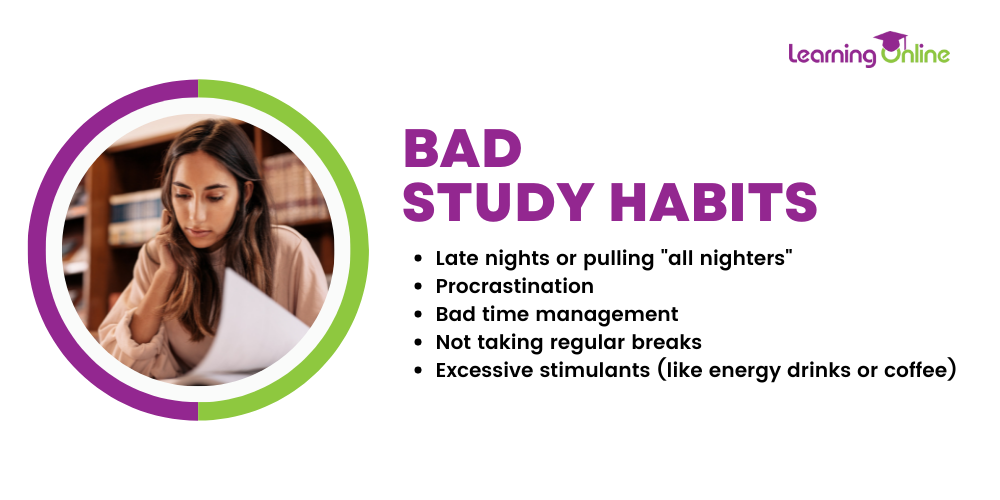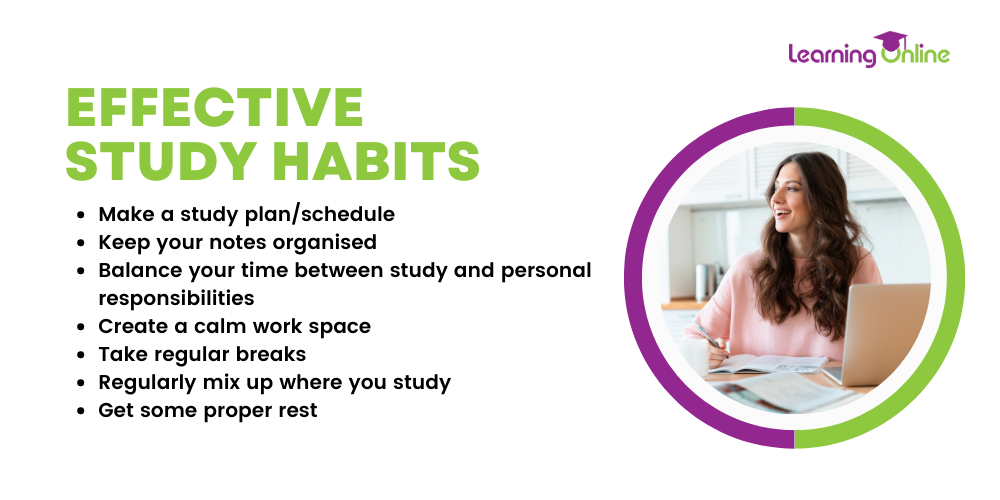Learning how to learn can be one of the most challenging parts of any educational endeavour. Organising your time, structuring your study, finding the right tools to help keep track of your progress, as well as making sure that you take regular breaks to keep your mind fresh are all important need-to-knows when it comes to setting yourself up for success in your chosen course.
Getting into good study habits will help you to breeze through your course, making the whole experience more enjoyable with minimal stress.
But what are these good study habits, you ask? My Learning Online has got your back!
In this blog, we are going to take you through good study techniques to help you get your work done and give you the best possible outcome of your training.
Bad study habits
It’s important to remember that we all learn in different ways. What works for one person will not work so well for another, and so the best thing to do is focus on your own path and not worry about how everyone else is doing it – this is YOUR learning journey.
However, a few common bad study habits can easily be fallen into when the work mounts up. So be aware of these traps and try to avoid them where you can:
- Late nights and the dreaded ‘all nighters’ – Any student will know the last minute cram in the library, seeing in the early hours with blurry eyes and a fuzzy brain. While some people are night owls and will find they do their best work at night, trying to study through the night is not the best idea for the most part.
Being strict with yourself that daytime is for work and nighttime is for rest will ensure you get the proper downtime and restoration needed to maintain your brain. It’ll also help to keep you on top form, ready to go again the next day. - Procrastination – We’ve all done it, last minute.com. Facing work when there are more interesting things you would rather be doing can feel like a Herculean effort. However, the stress that procrastination causes, in the long run, can feel even worse and can become completely overwhelming. Trying to spread your workload out in bite-size chunks over a longer space of time will make it all feel much easier and will not overload your brain with too much information in one go.
- Bad time management – It’s easy to fall into a trap of ineffective time management, and similarly to procrastination, not beneficially using your time can leave you feeling overwhelmed and out of your depth. Breaking study sessions and tasks down into smaller, more manageable pieces throughout the days and weeks will add up. And rather than trying to swallow a huge mouthful of work in one go, you will have absorbed this knowledge at a more consistent, regular pace – increasing your chances of recalling this information when needed!
- Not allowing yourself regular breaks – One of the most common mistakes that students make when studying is trying to power through and not giving themselves regular breaks to stretch and refresh their body and mind. Sitting still for too long will not inspire creativity, so it is important to make sure you get up to move around every half hour or so. You should also implement proper breaks throughout the day to nourish yourself, get some fresh air and perhaps even engage in a fun activity or hobby.
- Excessive stimulants – Coffee and energy drinks can sometimes feel like the only things keeping us upright, but the excessive consumption of these stimulants can cause short highs and crashing lows, which, when studying, can be quite unhelpful. Giving yourself the proper nourishment and hydration to ensure a slow and steady release of energy is the ideal fuel for long study sessions. Think about it; you wouldn’t run a marathon on just a latte, and energising your brain is no different.

7 effective study habits
Here are a few good study habit examples to inspire you, so you can find the best and most effective way of working for YOU:
1. Make a study plan/schedule
Put those highlighters to good use and map out a clear, colourful study plan for yourself. You can do this as a daily task or map out your study sessions for a whole week or month. However, you choose to do it, setting up a schedule for your learning can help to keep things manageable and stop you from going into study overload.
2. Organisation
Easier said than done; keeping track of your notes and assignment progress can fall by the wayside in the midst of a course. The information is coming in at warp speed, and it can be hard to keep up.
Finding a system that works for you will mean your workload doesn’t get out of hand, and you will continue feeling empowered and in control. This could be putting aside an hour in the evening to sort and organise the work you did during the day, keeping a structured filing/notes system as you go along so you can maintain work management, or keeping lots of lists that you can tick off when a task is complete.
3. Time management
A tricky thing when it comes to study, managing your time effectively can pose a challenge to even the most organised of students. Things come up, life happens, plans change, these things are inevitable. But if you weave proper study time into your daily routine, it can make the whole learning experience so much more manageable.
Getting a balance between your studies, personal time, work commitments, keeping up with friends – it can feel impossible to fit it all in. Why not keep a clear diary of your commitments and study plans, as this way all the information is right in front of you, letting you know what you need to do and when
4. Calm workspace
A tricky thing when it comes to studying, managing your time effectively can pose a challenge to even the most organised of students. Things come up, life happens, and plans change, and these things are inevitable. But if you weave proper study time into your daily routine, it can make the whole learning experience so much more manageable.
Getting a balance between your studies, personal time, work commitments, and keeping up with friends – it can feel impossible to fit it all in. Why not keep a clear diary of your commitments and study plans, this way, all the information is right in front of you, letting you know what you need to do and when.
5. Regular breaks
Stretch, dance, walk, run, snooze, read, watch or cook something; whatever rest and restoration looks like for you, it is vital to implement proper breaks into your days. We are not robots and cannot just sit still and learn effectively for hours on end. We’ve gotta shake it up! Our neighbours at Study Smarter outline the benefits of taking regular study breaks.
6. Mix it up
Don’t get stagnant sitting in one space for too long – mix up your workspace! Perhaps make a plan of the different places you plan to study that week to give yourself a change of scenery. Go study in the library for a bit, take your laptop to a coffee shop, and find an outside area to take in the fresh air and knowledge. Mixing up your workspace will help you to keep engaged and stimulated during your studies and will help ease feelings of study fatigue.
7. Rest
Rest is SO important. Your brain and body cannot be maintained if they don’t receive proper rest and recuperation. Whether you like to take naps in the day, get an early night and a full 8 hours, or just ensure that you get some proper rest and downtime during the day to do something you enjoy, it’s vital to get proper rest. In fact, allowing yourself to properly rest – and not just powering on through regardless of what your body tells you- will give you longevity when it comes to studying.
Even if you manage to implement only 5 good study habits from this list, you will have a solid foundation upon which to get the most out of your time and breeze through your course and onto success!

Ready to start your study journey?
Here at My Learning Online, we offer a multitude of courses in various work sectors. Check out our range of courses in:
- Photography
- Wildlife and Animal
- Beauty
- Agriculture and Farming
- Lifestyle
- Landscaping and Horticulture
All our certificates follow an entirely online course structure, giving you the flexibility to work your learning around your schedule and lifestyle. This 24/7 access to learning and total flexibility sets us apart from other study programs and is the perfect choice for anyone who may not have the time or resources to commit to a full-time degree course.
We have a friendly team of course consultants on hand to answer any questions or queries you may have and to help direct you towards the best course for you. Speak to one of our consultants today to learn more about any of the courses that spark your interest.
Let’s get studying!





